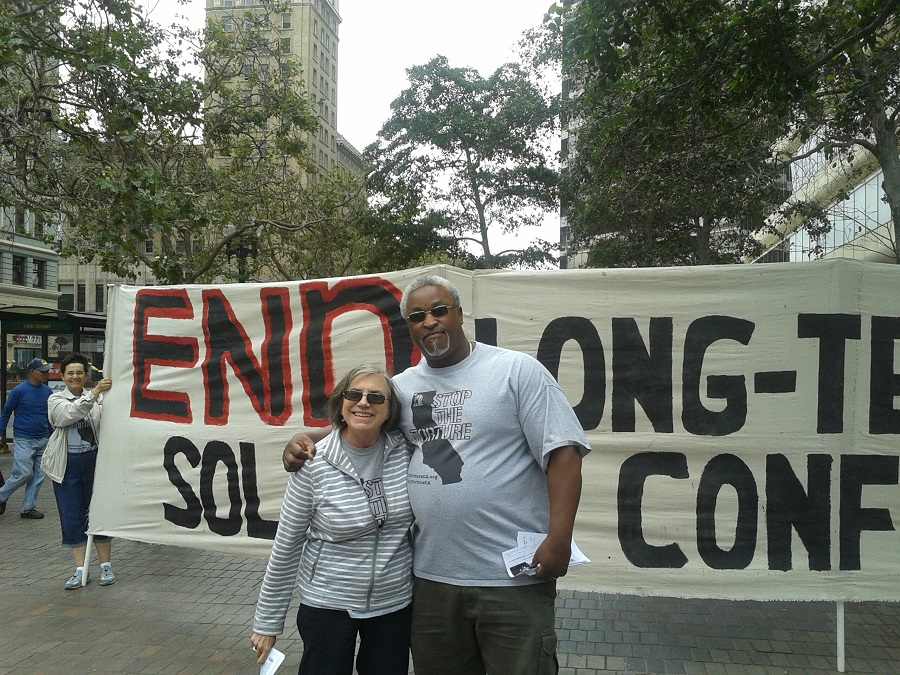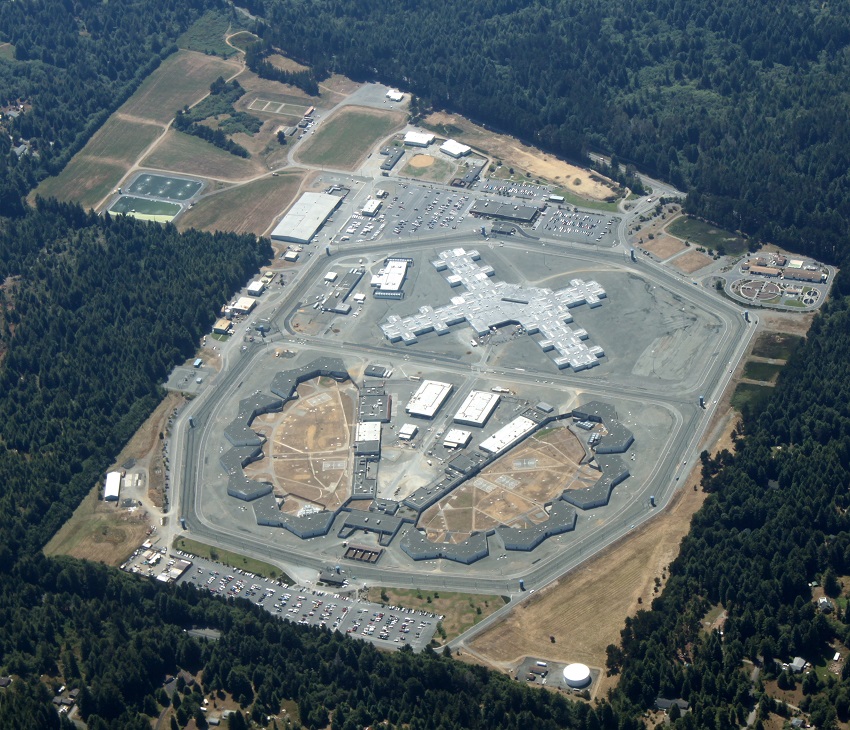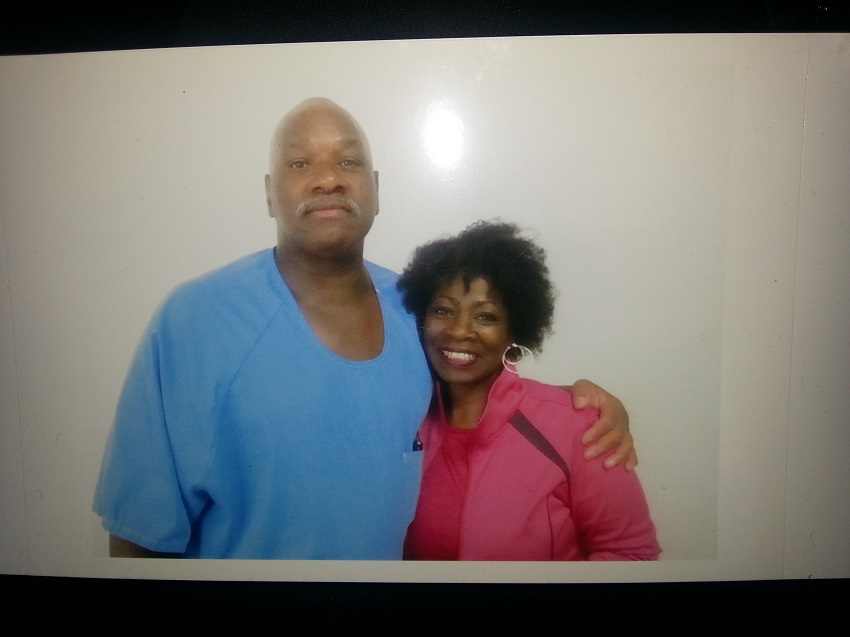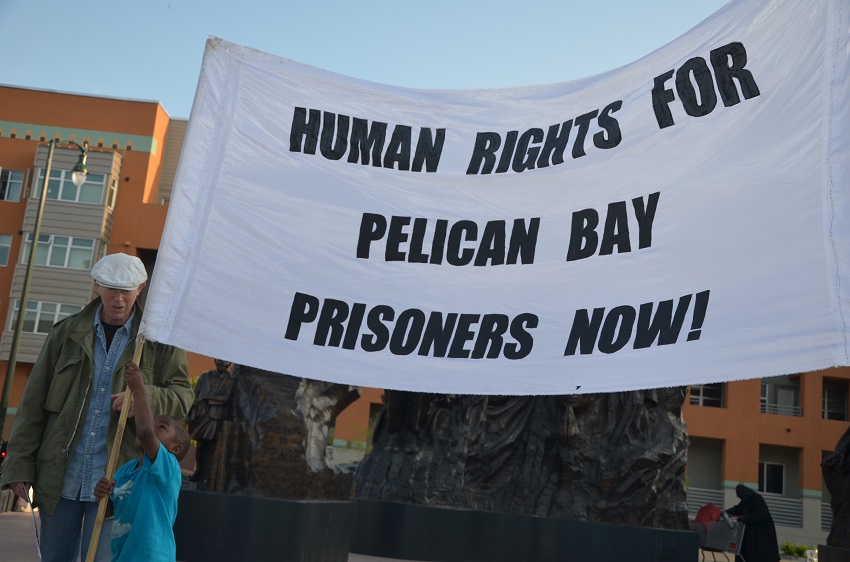
AFSC staff Laura Magnani and Jerry Elster in front of a protest sign reading "End long-term solitary confinement" AFSC
Laura Magnani, Program Director for Healing Justice in the San Francisco office, interviewed Marie Levin, sister of Sitawa Nantambu Jamaa (aka Ronnie Dewberry) who spent 31 years in solitary confinement in California until the legal settlement reached in 2015 resulted in the transfer of 1500 prisoners to general population.
When Marie found out that prisoners in the security housing units (SHU) were planning to go on hunger strike she became concerned, and then increasingly active in the movement to end solitary. She has worked through Prisoner Hunger Strike Solidarity Coalition and California Families Against Solitary Confinement.
Families of people in prison have been the backbone of the coalitions on the outside. Their stories, their energy and their leadership have made real change possible in ways not seen before. This post is the first in a series of spiritual journey stories from incarcerated folks or their family members.
Laura Magnani (LM): For a number or years you weren’t able to go visit your brother for a range of structural and emotional reasons. What changed? How did your spirituality help you through this?
Marie Levin (ML): For years I didn’t go because it was too painful. The pain he went through and the conditions in solitary; I couldn’t do anything about it. It was overwhelming. Also, Sitawa was very angry. His letters were full of anger. I couldn’t always read those letters. I visited through my mom and my sister, but that changed when my sister died in 2010. Also, my mother had three strokes and could no longer make the trip to visit him. [Pelican Bay, where he was being held, is almost at the Oregon border and it is a seven hour drive from the Bay Area.] Somebody had to step up. He needed to know that his family still cared. I had to get outside of myself.

Then, in 2011, the men at Pelican Bay started to talk about going on a hunger strike – risking their lives to change things. He had been in isolation for 27 years at that point. On a spiritual level it is all about love, not just love for him but all the people I didn’t know.
I didn’t know anything before the hunger strikes. Sitawa and I are only 10 months apart. We were close growing up. I used to think that prisons were about: “if you did the crime, you do the time.” We don’t believe he did the crime. At first I was willing to just help him, but now I know that there are many people in the same boat.
I had only visited a couple of times before the hunger strikes. When I started going again in 2012, I found a different person. It was hard to get there, but as I got to know others making the trip I was able to get rides and get there every other month on average. At first, the visits were less than two hours, through glass, talking through phones. Visiting times were extended to three hours on both Saturday and Sunday as a result of the strikes.
LM: Tell us what it was like when you started getting to know him again?
ML: At first, I just cried. He told me not to. “What is in the past is past. We’re beginning today,” he said. He was very warm and big brother-ish. “I never stopped loving you. I don’t care if you haven’t been coming. You are here now.” I saw his humanity even through his struggles. I think having the visits let him get out of his cell for a few hours. We didn’t talk about conditions inside but about family, the neighborhood, things that would make him smile and laugh.

LM: How important was involvement in the Prisoner Hunger Strike Solidarity Coalition (PHSS) with your whole journey related to activism and solitary confinement?
ML: PHSS was very enlightening. I hadn’t expected it. I was being pushed along by strangers who became my family. Isaac was handling the media and he arranged interviews with the press, he told me “Just speak from your heart." Karen came and did legislative training for us. AFSC coached me through my first testimony at a legislative hearing. They told me, “If you get nervous, just tell the legislators you haven’t done this before and you are nervous. They will eat out of your hands.” That’s just what I did.
Jules Lobel, who was handling the lawsuit, came out and briefed us on the lawsuit and met with the coalition. The UN Rapporteur on torture came and told us that solitary confinement beyond 15 days was torture, and how to use UN processes to get the truth out. Legal Services for Prisoners with Children and All of Us or None showed us connections to the Black Panthers and others who came before. As a coalition, we were connected to so many groups. I didn’t know anything before getting involved with PHSS.
LM: Your relationship with your brother seems to have changed since your involvement in the movement. Was there a particular realization or moment that began this shift?
ML: When I realized he was one of the four key representatives in the hunger strike. He didn’t always agree with the others, but he was respected for his writings and his clear thinking. God has given my brother so much wisdom and insight. Once he was released to general population, he immediately started building peace by implementing the Call to End Hostilities. This was a document the men inside created in 2012, before the second and third hunger strikes, to help prisoners find alternatives to addressing conflicts that arise.

LM: After learning about how the criminal justice system works (or doesn’t work) what do you want people to know and what do you hope they can do to change things?
ML: I want people to know the fight is not over. We need to continue. God is in the midst of this work. Not everybody knows that or is public about it, but we need to give God more credit. These changes haven’t come about by accident. The people of Israel called out and God sent Moses. The exodus across the Red Sea didn’t happen by itself. The men inside are trying to implement big changes. We need to recognize who we are. This is not a fight between flesh and blood; it is a fight between good and evil. The real enemy is the system. What can we do to counteract that?
I know our prayers are working because I prayed that the correctional officers who were really negative and hostile would be moved out and progressive staff would be moved in. Now the warden where Sitawa is being held is showing real leadership to make good changes. My brother has witnessed several people being replaced because they were not willing to make positive changes.
Note: Marie and her husband have a weekly conference call to pray for the prisoners. It happens 6a.m. – 7 a.m. Pacific Standard Time every Friday morning at 712-482-1500 Access Code: 648878#.
LM: For you, is this journey mostly about politics, about family, or about something spiritual?
ML: I would say “yes” to all of those. PHSS has become my family, and it has also been a political awakening. Who would think I could lobby and do public speaking? The spiritual part is about not judging people. People can change. So many prisoners have shown that. I’ve been going to graduations for formerly incarcerated people. Offer rehabilitation and see what happens. These guys have taken it upon themselves to learn and change and they help each other. The struggle is far from over.